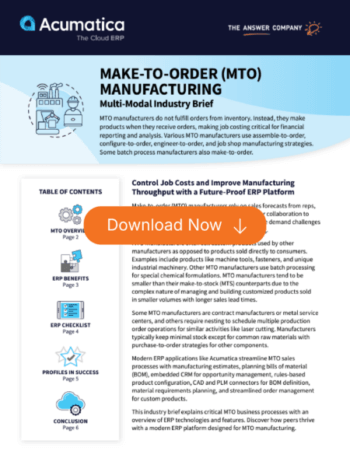
In the ever-changing world of manufacturing, the Make-to-Order manufacturing (MTO) approach is a standout method that differs from traditional inventory-based strategies. Unlike manufacturers who produce goods in advance (Make-to-Stock or MTS), MTO businesses create products when customers place orders. This makes job costing a crucial factor for financial reporting and analysis.
In this blog, we’ll explore the complexities of MTO manufacturing, focusing on the challenges financial leaders encounter. Plus, we’ll showcase how a forward-looking ERP platform, like Acumatica, can bring transformative benefits to your financial processes.
The MTO Manufacturing Landscape
MTO manufacturers navigate a complex web of variables, relying on sales forecasts, historical estimate conversion rates, and customer collaboration for planning manufacturing operations. These companies often produce custom products other manufacturers use, such as machine tools, fasteners, or unique industrial machinery. With longer sales lead times and smaller volumes, MTO manufacturers are inherently more complex to manage than their MTS counterparts. Download the Make-to-order (MTO) manufacturer Multi-Modal Industry Brief to learn more about how Acumatica can streamline your financial processes. Contact us today to start the conversation.
Critical Business Processes for MTO Manufacturing
Demand Planning
Unlike MTS manufacturers who can rely on sales history, MTO manufacturers must employ a mix of estimated conversion rates and sales forecast probability from Customer Relationship Management (CRM) applications. Historic conversion rates and CRM sales forecasts are pivotal in predicting future demand and shaping operational plans.
Product Design
Product design in make-to-order manufacturing environments is unique and multifaceted. Job shops create custom products based on estimates, while CAD and PLM connections facilitate Engineer-to-Order (ETO) product designs. Configuration rules come into play for Configure-to-Order (CTO) manufacturers, and only Assemble-to-Order (ATO) manufacturers have standard bills of material.
Order Management
Sales orders are the driving force behind MTO manufacturers’ material plans, scheduling, purchasing, and production plans. Requisitions feed into estimates, and outside processing costs are integrated into the ERP platform’s purchasing and estimating processes.
Production Planning
Accurate production planning hinges on precise estimates, bills of material, and routings. With purchase and production orders linked directly to sales orders and finite scheduling optimizing resources, MTO manufacturers can react swiftly when customers approve orders.
Post-Production
After the production process, finished goods move to inventory for fulfillment, and Work-in-Process (WIP) costs flow through to accounting for Payable and Receivable processing. Data collected during this phase is invaluable for analysis, including WIP job cost reports and general reporting.
Advantages of Acumatica ERP Platform for MTO Manufacturers
1. Accurate Manufacturing Plans
Acumatica ensures accurate estimates, bills of material, and routings, enabling manufacturers to know precisely what it takes to produce make-to-order manufacturing items. This clarity facilitates improved purchasing and resource scheduling, allowing MTO manufacturers to react faster to customer approvals.
2. Automation of Activities
Material and labor backflushing, native barcode scanning, and a warehouse management system streamline manufacturing transactions. Rough-cut-capacity planning (RCCP) drives material requirement planning (MRP) for timely inventory, and embedded AI with machine learning enhances financial transactions.
3. Employee Empowerment
Unlimited user licenses enable businesses to extend the ERP platform to every employee, ensuring a 360-degree view of operations in real time. Intuitive mobile apps work on even the most rugged devices, providing remote and shop-floor employees access to essential data.
4. Boosting Revenues and Profits
Acumatica facilitates the creation of accurate product estimates with markup percentages for labor and material, enhancing profitability. Real-time monitoring of work-in-process costs and quantities and role-based dashboards ensure errors are spotted before impacting profits.
5. Exceeding Customer Expectations
By providing manufacturing estimates, rules-based product configuration, and engineering connections for CAD and PLM, Acumatica enables faster quote delivery. Automated quote delivery and electronic signatures enhance the quote process, and self-service access for customers further improves service quality.
6. Informed Decision-Making
Role-based dashboards and flexible reports offer actionable data with drill-downs, providing deep insights into job costs, resource utilization, and capacity constraints. Dimensional analytics via Microsoft PowerBI further enhance decision-making capabilities.
The Ultimate Future-Proof MTO ERP Platform
In the challenging world of make to order manufacturing, Acumatica Manufacturing stands out as a future-proof ERP platform that addresses this industry’s unique needs and challenges.
From demand planning to post-production analysis, Acumatica provides the tools necessary for MTO manufacturers to boost revenue, grow profits, empower employees, and exceed customer expectations. With Acumatica, MTO leaders can transform their business operations, manage highly customized products without intrusive customizations, and stay ahead in a competitive market.
Discover the advantages this cloud-based ERP software can bring to your manufacturing company by scheduling a complimentary discovery call.
Related Resources


The Ultimate Guide for Mastering Inventory Valuation and Manufacturing Costing
Read the Article

